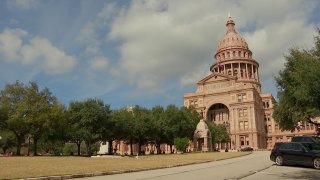
Texas would have to spend tens of billions of dollars to get rid of the state’s property taxes, state budget officials said Wednesday — a reality check on some conservatives who want to end them once and for all.
Republican lawmakers have been on a yearslong push to bring down the state’s property taxes, among the highest in the nation. Some Texas conservatives have long dreamt of getting rid of at least some property taxes altogether — an idea others have criticized as unrealistic given the gargantuan cost of doing so. Lt. Gov. Dan Patrick, a skeptic of doing away with property taxes, tasked lawmakers earlier this year with tallying the cost.
Now, lawmakers have those figures in hand. Getting rid of all property taxes collected by school districts would have cost the state $39.5 billion in tax year 2023, figures presented to the Texas Senate Finance Committee by the Legislative Budget Board show. School property taxes, which pay for costs like teacher salaries and new facilities, represent the largest chunk of a property owner’s tax bill.
In addition, the state would have had to shell out another $42 billion to cover the property taxes collected by cities, counties and special taxing districts last year. All told, the state would have had to spend $81.5 billion to completely eliminate all local property taxes. That’s more than half of the $144 billion that lawmakers allocated for Texas’ current two-year budget.
Get top local stories in DFW delivered to you every morning. >Sign up for NBC DFW's News Headlines newsletter.
Spending that much money on tax cuts would significantly hamper the state’s ability to pay for other costs and would likely require a significant sales tax hike, lawmakers said Wednesday. There appeared to be little appetite among committee members to do so.
“This is not something that you can find $81 billion on a per-year basis and not have a major impact on the remaining sales tax rates, because that is a huge amount of money to be able to replicate,” said state Sen. Paul Bettencourt, a Houston Republican and Patrick’s chief lieutenant on property taxes.
Texas doesn’t levy its own property tax. Instead, cities, counties, school districts and special taxing entities collect property taxes. Property tax bills have climbed over much of the last decade as the state’s economy boomed and property values and tax rates rose.
Texas News
News from around the state of Texas.
To try to rein in rising property tax bills, state lawmakers have spent billions of dollars and put tighter limits on how much more in property taxes school districts and local governments can collect. Last year, legislators approved a $12.7 billion package consisting of targeted tax breaks for homeowners and money for school districts to drive down how much they collect from property owners. For homeowners, those efforts appear to be working.
The amount of property taxes school districts collected fell by nearly 10% between 2022 and 2023, according to figures provided by the Texas Comptroller’s office. Total property tax collections, however, fell less than 1% in that time frame, driven by a 10.3% increase in the amount of property taxes collected by cities, counties and special taxing districts.
The state’s top Republicans have signaled they’re not done slashing property taxes. Patrick, the leader of the Texas Senate, and House Speaker Dade Phelan each tasked legislators in their chambers with exploring more cuts before they reconvene in Austin for next year’s legislative session. Gov. Greg Abbott said earlier this year that the Legislature should continue to hammer away at property taxes “until we get rid of the school property tax rate here in the state of Texas.”
Doing away with the property tax rate that pays for school districts’ maintenance and operations has long been a dream among some Texas conservatives, but proposals to do so have been dead on arrival in the Legislature. Still, some conservative thinkers contend the state should chip away at property taxes over time until they’re eliminated.
“Property taxes are not just a financial burden,” said Vance Ginn, a conservative economist who runs his own economic consulting firm. “They are fundamentally immoral.”
Even if lawmakers had an appetite for doing away with property taxes, finding the money to make up for that revenue would be difficult.
Texas doesn’t have an income tax, and outside of the property tax, the state relies heavily on sales taxes to pay for government services. Thus, getting rid of the property tax would likely require a significant hike in the sales tax — an idea that has proven highly unpopular in the past. Texas would have to more than double its sales tax rate to eliminate all property taxes, a recent analysis by the Texas Taxpayers and Research Association found.
Sales taxes are also a more volatile way to fund the government because they’re more vulnerable to economic downturns and shifts in consumer spending. The burden of paying sales tax falls harder on lower-income households because sales taxes make up a higher share of their income than they do for households higher up the income ladder.
“Hitting low- and middle-income Texas families with this dramatically higher rate would seriously damage both their household budgets and the state economy as a whole,” Shannon Halbrook, a fiscal analyst at the left-leaning Every Texan, told lawmakers Wednesday.



